News
Steps forward with DHL

On November 25, the German National Contact Point for the OECD Guidelines for Multinationals signed a renewed protocol covering the relations between UNI, ITF and Deutsche Post DHL for another 2 years. The protocol emphasizes regular dialogue based on a set of key principles.
UNI General Secretary, Christy Hoffman, said:
“We’ve been in dialogue with DHL for several years and welcome the renewal of this historic protocol. The protocol makes clear that DHL will respect the OECD Guidelines and rights of workers to organise, and for UNI this is what it is all about. DHL is one of the world’s largest employers and these commitments are essential for workers in those countries where the laws and practices don’t work to protect these rights.”
The protocol, which was first signed in July 2016, sets out to protect workers’ rights and improve dialogue between the company and unions representing DHL workers worldwide.
For UNI, the dialogue with DHL has opened the door to a better relationship between its affiliates and the company worldwide. Last month, the Kesatuan Pekerja-Pekerja DHL Supply Chain union in Malaysia, achieved recognition from DHL Supply Chain (M). A memorandum of understanding with the company allows the union to expand its activities and talk to workers in preparation of a first collective agreement. This is the second union recognized for DHL workers in Malaysia.
Head of UNI Post and Logistics, Cornelia Broos, said:
“I’ve been meeting with DHL workers around the world for some time. Most recently we held our first DHL Africa Alliance Meeting in Nairobi where we had the oportunity to bring together 10 unions organising more than 3000 workers in DHL from 10 different African countries. I know that things aren’t always perfect on the ground, and we have some open issues in a few countries, but this protocol means that there is a way to talk things through with the German management and that we have a pipeline for dialogue in both directions. It makes a difference. “
The Protocol is widely recognized as an innovative step by the German NCP to both support dialogue and to promote the Guidelines.
The OECD Protocol 2020 contains a more concrete process for raising issues, and embraces a policy of pro-active engagement in order to avoid problems before they arise.

